The storm outside hadn’t stopped when the baby came. Wind rattled the hospital windows, rain sliding in crooked lines down the glass. Emily barely noticed. All she heard was her daughter’s cry; thin, perfect, alive. When the nurse placed the baby in her arms, everything else disappeared. James stood beside her, unmoving. His eyes weren’t on Emily.
They were fixed on the child. The nurse said something cheerful, but the words didn’t land. He leaned closer, then froze. His face drained of color, his breath caught halfway between disbelief and horror. Emily looked up, confused. “James?” she whispered. But he didn’t answer. He just stared. The room, moments ago filled with light and relief, suddenly felt colder.
The nurse adjusted the blanket, humming softly as she handed the baby back. Emily smiled through her exhaustion, unaware that behind James’s silence, something had already begun to shift, a quiet fracture forming in the life they had waited so long to build.
Emily used to think love was unshakable once it was tested. She’d believed that about her marriage, that no disappointment, no silence, no slow erosion of hope could undo what she and James had built. For years, that belief had kept her steady. Even when the house started to feel too quiet. Even when the test results kept saying not this time.

They’d been trying for three years. Every month was another circle on the calendar, another heartbeat of hope that ended in quiet defeat. She cried sometimes, but never in front of him. James didn’t like to talk about what hurt. He’d just hold her hand, say next time, and stare past her at the television.
Toward the end of the second year, something in him changed. He grew distant, not angry, not cruel, just absent. His touch became polite. Conversations stayed surface-deep. He started spending longer hours at work, or sitting in the garage under the pretense of fixing things that didn’t need fixing.

She knew what it meant without needing him to say it. He wanted a family, and she couldn’t give him one. Once, she caught him standing in the half-painted nursery, looking at the empty crib they’d never used.
His face was unreadable, but when he noticed her watching, he turned off the light and walked out without a word. That silence hurt more than anything he could have said. Still, she tried to stay hopeful. She went through every treatment, every suggestion the doctors made. She prayed until it felt like pleading with a wall.
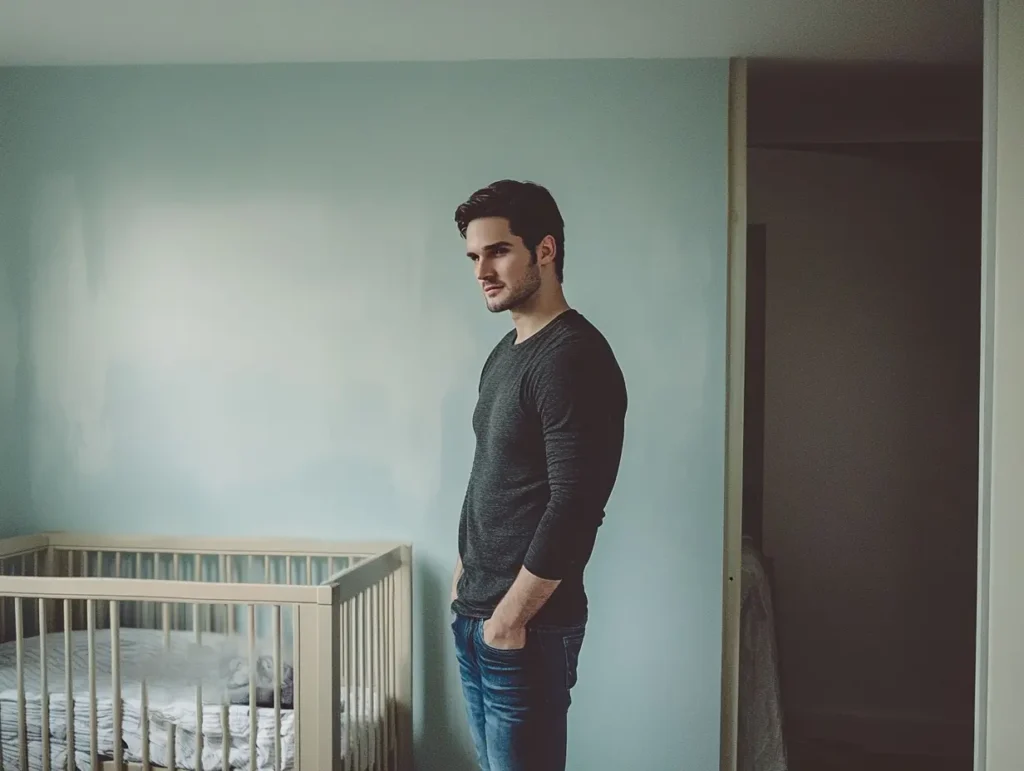
And then, one morning, the line appeared. Faint, but there. She stood in the bathroom holding the test, her hands shaking so badly she almost dropped it. For a full minute, she couldn’t breathe. Then she laughed, one sharp, stunned sound that startled her.
When she told James, his expression changed in an instant. The weariness she’d been living with for years vanished. He wrapped his arms around her, whispering her name over and over, his voice thick with disbelief.

From that day on, he was different again, like the man she’d married. He read parenting books, built the crib a second time, painted over the old walls. He joked about diaper duty, made lists for baby-proofing. He held her belly every night before bed and spoke to the baby in a soft voice she’d never heard before.
Sometimes, when she watched him like that, she wondered if this was all it took to fix what had broken between them. A heartbeat inside her, proof that they still had a future. The pregnancy wasn’t easy. Morning sickness turned into all-day exhaustion, her ankles swelled, her moods swung like doors in a storm.

But James was patient. He made her tea, rubbed her shoulders, held her hair back when she was sick. He even came to every appointment, even when work called. For the first time in years, Emily allowed herself to believe everything would be okay. The contractions started on a rainy afternoon in March.
The sky had gone dark early, thunder rolling in the distance. James drove her to the hospital with one hand on the wheel, the other gripping hers tightly. Labor was long. Hours blurred into each other, marked only by monitors beeping and nurses murmuring reassurances. When the pain became unbearable, the world faded. She heard voices, felt hands, and then, nothing.

When she woke, the room was dim. Her body felt hollow, heavy, the ache of something monumental just passed. For a moment, she couldn’t remember where she was. Then she heard it, a soft cry, small and perfect. She turned her head. James was standing by the crib. His back was to her. The baby’s cry quieted, replaced by the sound of rain against the window.
“James,” she whispered, her voice weak. He didn’t answer. She tried again. “Is she okay?” He turned slowly. His face was pale. In his arms, the baby shifted, wrapped snugly in a white hospital blanket. Emily smiled through tears. “Let me see her.” He hesitated. Just for a second, but she saw it. A flicker of something sharp in his eyes.
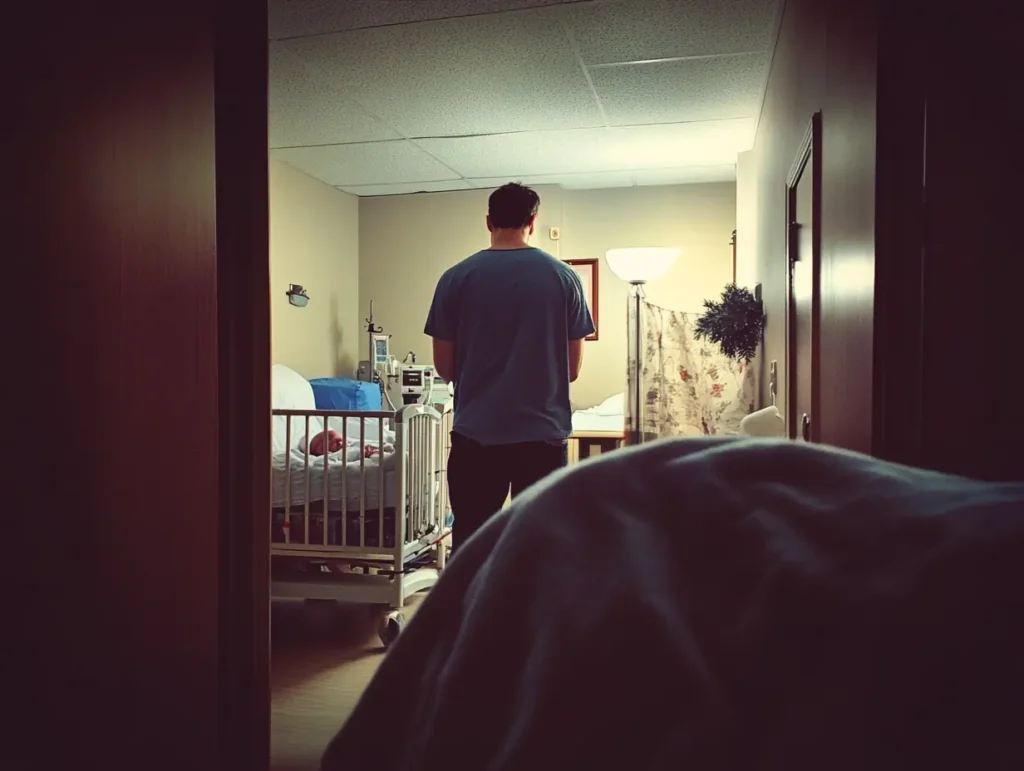
When he finally stepped closer and lowered the baby into her arms, Emily felt her heart swell. The tiny weight, the warmth, the impossibly small fingers. “Hi there,” she whispered. But James wasn’t looking at her. He was still staring at the baby, expression frozen. “What is it?” she asked softly. He blinked, forcing a smile that didn’t reach his eyes. “Nothing. I just—she’s beautiful.”
Emily smiled, but a faint unease lingered. She looked down at the baby again, tracing her tiny nose, her delicate mouth. Nothing seemed out of place. But when she looked back up, James was still watching with that same hollow expression. Something in his face made her shiver. The first hours after birth passed in a blur of light and exhaustion.
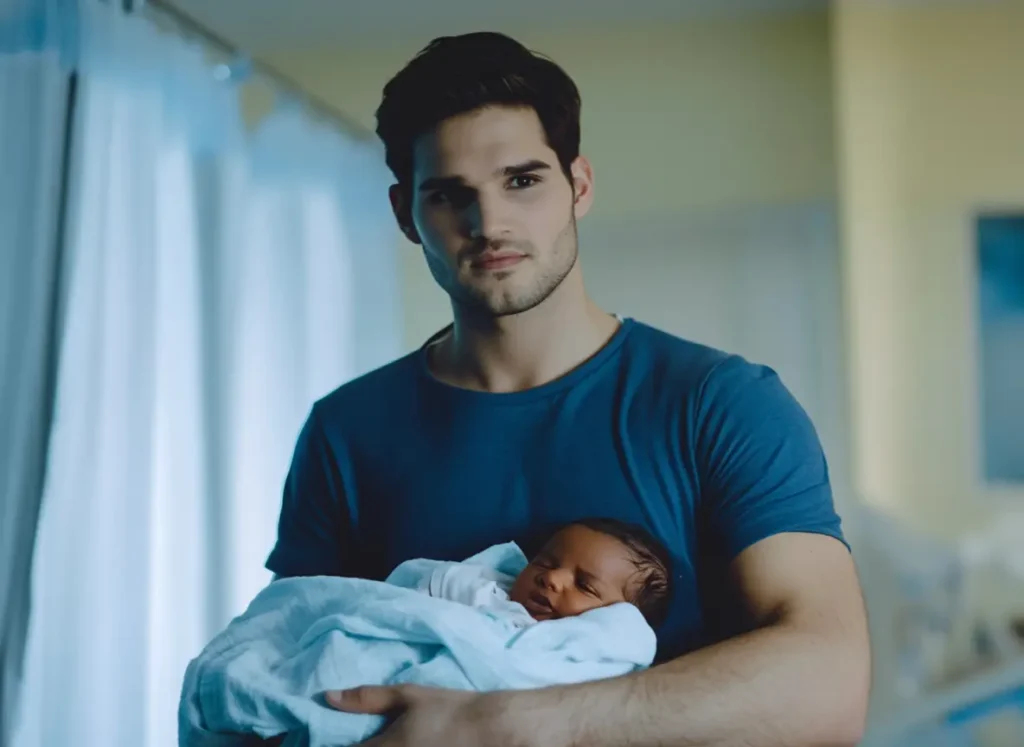
Emily drifted in and out of sleep, her body aching, her heart full. Every sound, the rustle of the blanket, the quiet hum of machines. It all felt sacred. James was quiet, but she told herself it was just nerves. He hovered near the crib, watching the baby as though afraid to touch her. When Emily asked if he wanted to hold their daughter again, he hesitated, then said softly, “In a bit.”
She brushed it off at first. He’d been through a lot, too. The delivery had been long and frightening; she’d fainted near the end. Maybe he just needed time. A nurse came in to check vitals and jot notes on her clipboard. James stepped closer to her, speaking low enough that Emily couldn’t make out every word, only pieces, “normal?”… “not what I expected.”

Before she could ask what that meant, his phone rang. He muttered an apology and stepped into the hall, leaving the door half open behind him. The nurse lingered, tidying the blankets, adjusting the monitor. Then she looked at Emily with a faint smile, the kind people use when they’re trying to comfort someone who doesn’t yet know they needed comforting.
“He’s just nervous,” the nurse said gently. “Nervous?” Emily frowned. “First-time dads always are,” the nurse replied. “And sometimes they notice little things. The skin tone, hair color, these things tend to worry them for no reason. It’s perfectly normal for newborns to look darker right after birth. Pigmentation evens out in a few weeks.”

Emily’s heart skipped. “So… it’s normal?” The nurse nodded. “Completely. I’ve seen it dozens of times.” She gave Emily’s arm a reassuring squeeze. “Don’t let it get to you.” When the nurse left, the room felt colder. Emily looked down at her daughter, tiny, quiet, her skin noticeably darker than she had expected.
She didn’t know what to think. She wanted to believe it was nothing, that the nurse was right. But when she met James’s eyes, the unease there mirrored her own. Later that afternoon, when their attending doctor came by, James spoke first. “We were told her complexion might change,” he said carefully. “But is this… normal?”
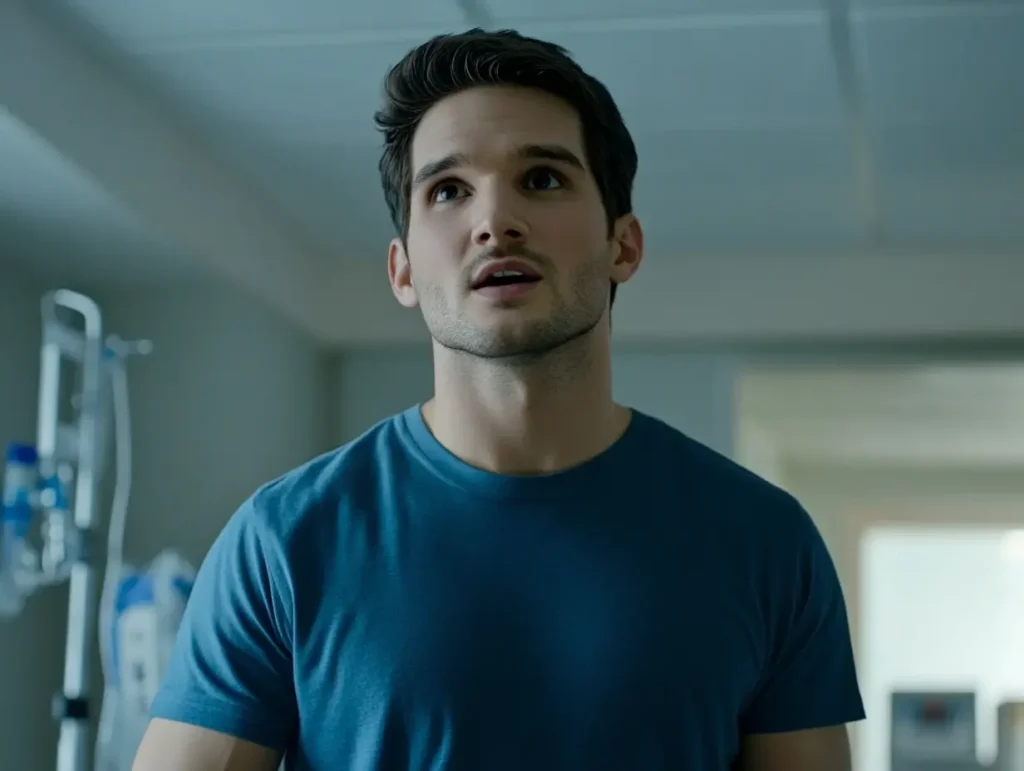
The doctor smiled politely. “It happens more often than you’d think,” he said. “Pigmentation can vary at birth and often evens out over the first few weeks. Sometimes it’s from genetics that go back generations, traits that skip many years before reappearing.” Emily nodded, but her stomach twisted. “So there’s nothing wrong with her?”
“Not at all,” the doctor said, reassuring but brief. “She’s perfectly healthy.” When he left, silence settled between them again. Emily studied her daughter’s tiny face, searching for something familiar, something that made sense. James stood by the window, staring out at the rain.

That night, after the ward lights dimmed and the hallway fell silent, Emily woke to find him standing by the crib again, unmoving in the dark. “James?” she whispered. He turned slowly, startled. “Go back to sleep,” he said. His voice was soft but distant, heavy with something he couldn’t yet admit.
She wanted to believe the doctor, to believe the nurse, to believe that everything would soon look the way it was supposed to. But the longer she watched James’s shadow by the crib, the more she felt it, the quiet shift between them that neither of them dared to name. One evening, after putting the baby down, Emily sat in the nursery folding tiny clothes.

The house was quiet, but not peaceful, it was the kind of silence that pressed down, heavy and waiting. She could hear James moving around downstairs, his footsteps measured, deliberate. When she finished, she lingered for a moment, watching her daughter sleep. The little chest rose and fell in a rhythm that should have been comforting.
Yet Emily couldn’t shake the feeling that everything in their home had subtly shifted — like the air had changed, like love had been replaced with something colder, quieter, harder to see. In the days that followed, James grew quieter. Not the kind of quiet that came from exhaustion, but something heavier.
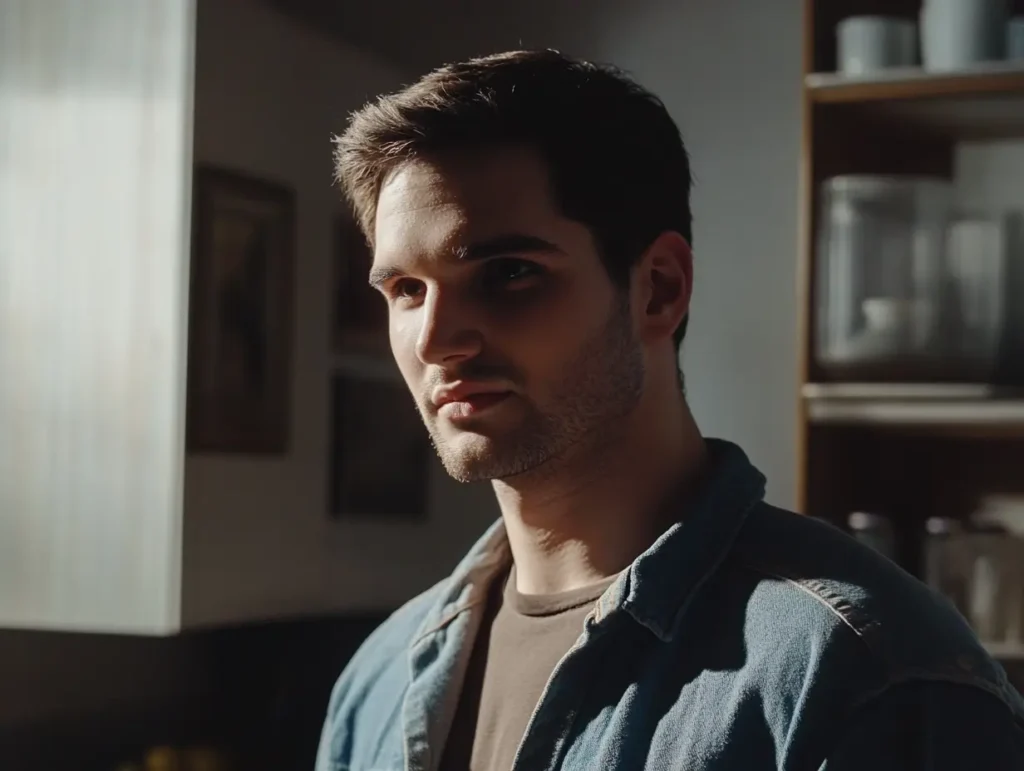
He moved through the house like a guest, answering Emily’s questions with half-hearted nods, his attention elsewhere. He sat at the dinner table most nights, staring at nothing, his food untouched. When Emily asked if he was feeling okay, he said he was just tired. When she brought up the baby, his shoulders tensed almost imperceptibly.
He didn’t smile anymore, not even at the little noises that used to make him laugh. At first, she told herself it was the stress. The sleepless nights, the crying, the newness of it all. But the way he looked at her sometimes, like she’d said something wrong without realizing it, began to chip away at her certainty.

One evening, after the baby had finally fallen asleep, Emily found him sitting in the living room in the dark. The television was off. The rain outside pressed softly against the windows. “James?” she said, her voice tentative. He didn’t look at her. “What?” “You’ve been so quiet lately,” she said gently. “If something’s wrong, you can talk to me.”
His jaw tightened. “There’s nothing wrong.” Emily frowned, “You don’t seem fine.” He stood abruptly, pacing toward the window. “Emily, not everything has to be talked about.” She blinked, stung by the sharpness in his tone. “I’m just trying to help.” He turned then, his expression strained. “You can’t help if you’re not being honest.”
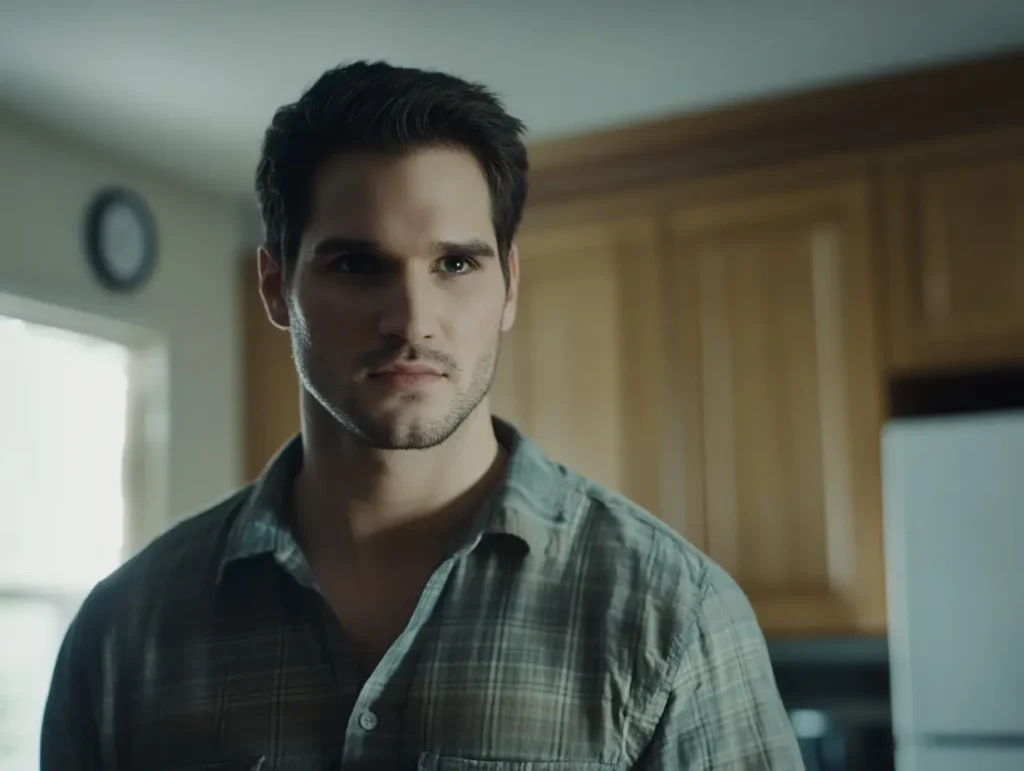
The words hit her like a slap. “What’s that supposed to mean?” she asked, her voice breaking. “Forget it,” he muttered, rubbing his forehead. “I just need some space.” “James,” she said quietly, “please don’t do this.” But he was already heading for the door, grabbing his keys and jacket. “I just need to think,” he said, voice cracking. “I need to clear my head.”
She stepped forward. “You’re not even going to say where you’re going?” He hesitated at the doorway, still not facing her. “Maybe that’s the problem. You always need to know everything.” And then he was gone. He hesitated at the doorway, still not facing her. “Maybe that’s the problem,” he said quietly. “You always need to know everything.”
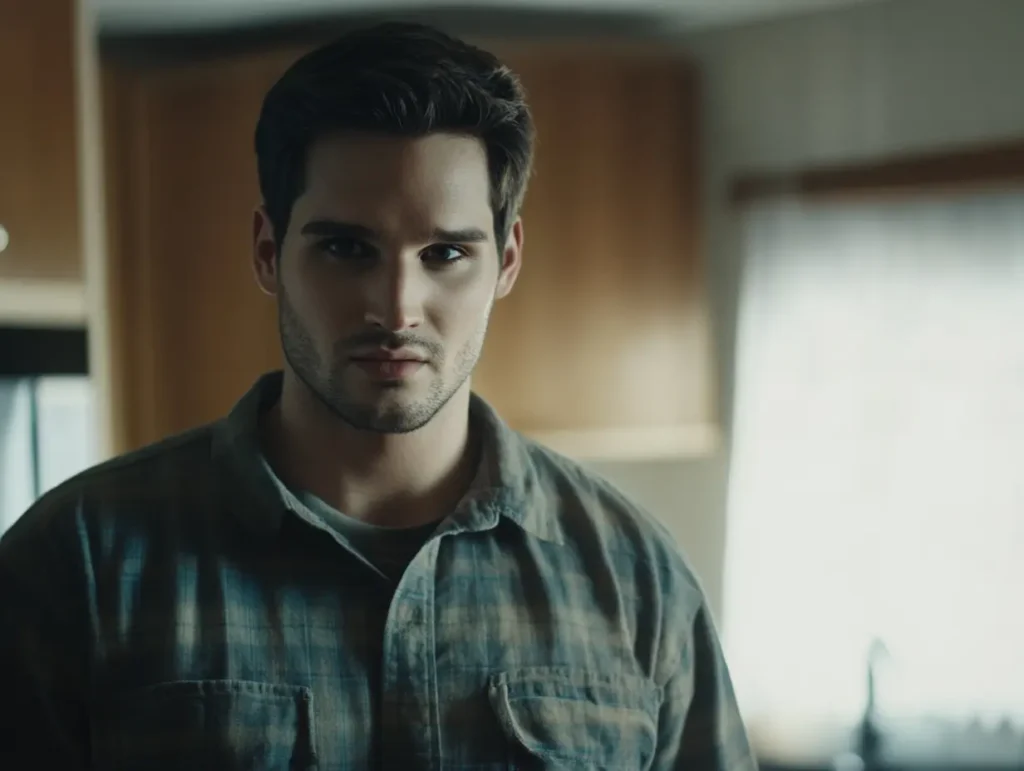
Before Emily could respond, he grabbed his keys from the counter. The door shut hard behind him. For a second, she just stood there, confused, and then instinct took over. She hurried after him, barefoot, the baby monitor still in her hand. By the time she reached the front door, his car was already backing out of the driveway.
“James!” she called, but the sound was swallowed by the engine and the rain. The taillights disappeared down the street, red streaks fading into gray. She stood there in the cold for a long time, until her arms started to shake. Then she went back inside, locked the door, and dialed his number. It rang twice before going to voicemail. She tried again. And again.

By the fourth call, the line went dead. When she texted, it didn’t deliver. He had blocked her. For hours, she sat at the kitchen table, staring at her phone, replaying every conversation of the past week in her head. Maybe it was her fault. Maybe he was overwhelmed, or scared, or finally realizing fatherhood wasn’t what he imagined.
The thought made her chest tighten, it had been his dream more than hers. Now, when it was finally real, he was gone. That night, she barely slept. The baby stirred beside her, tiny breaths steady and peaceful, while Emily lay awake, counting the seconds between the creaks of the house.

At some point before dawn, she rose quietly, moving through the dark toward their bedroom. The room still smelled faintly of him, aftershave, detergent, something that already felt like memory. She hesitated at the closet. She’d never gone through his things before. But this time was different.
She opened the wardrobe, searching for a note, a clue, anything that would make sense of what he’d done. At first, there was nothing, folded shirts, a half-packed gym bag, his old watch. Then she saw it, tucked between a pile of receipts and spare change. A single folded slip of paper. Riverton Diagnostics | Paternity DNA Testing | Paid in Full.

The paper trembled in her hands. She read it again, and again, but the words didn’t change. James hadn’t left because he couldn’t handle the pressure. He hadn’t left because he was scared of fatherhood. He had left because he didn’t believe the child sleeping upstairs was his. The next morning, Emily was running on coffee and nerves.
She’d barely slept. Every time she closed her eyes, the image of that folded receipt flashed behind her eyelids. Paternity DNA Testing. Paid in Full. By sunrise, she had already dressed the baby, strapped her into the car seat, and driven across town before she even decided what she would say. Her hands gripped the steering wheel so tightly her knuckles went white.

She didn’t know if she wanted to scream, cry, or just understand why. The sign for Riverton Diagnostics appeared suddenly, sterile and unassuming. She parked crookedly, heart pounding. Inside, the lobby smelled of disinfectant and fresh paper. The woman at the front desk looked up, polite but cautious.
“I’m looking for James Parker,” Emily said, her voice barely steady. The receptionist typed something into the computer, glanced at the monitor, then at Emily. “He was here earlier this morning. He’s already checked out.” Emily’s stomach dropped. “So he did it,” she whispered. “I’m sorry?” the receptionist asked.

“Nothing,” she said quickly. “Do you know when—when he’ll get the results?” “Within twenty-four hours,” the woman replied. “We call the client directly.” Emily nodded, though she barely heard. She turned to leave and froze. James was standing just outside the glass doors, his hands shoved in his jacket pockets, head down.
For a moment, neither of them moved. Then she stepped outside. “Emily,” he started, but she cut him off. “You actually did it,” she said, voice trembling. “I needed to know,” he said quietly. “Know what, James? That your wife didn’t cheat on you? That your daughter isn’t yours?” He flinched. “Don’t do that here.”
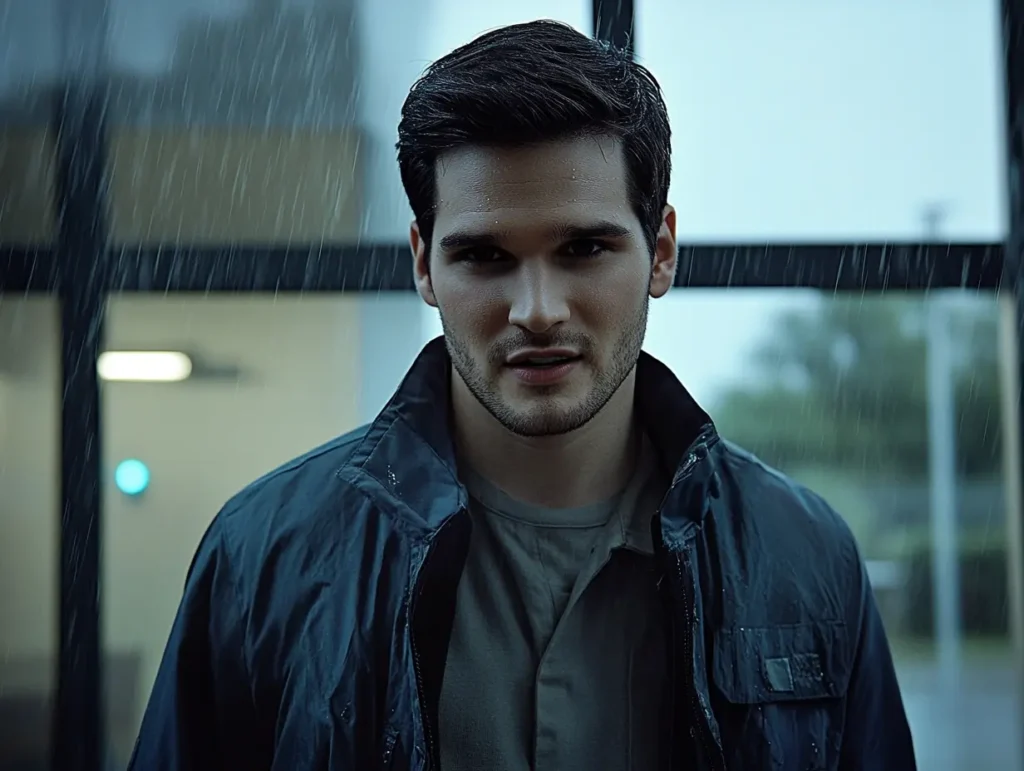
“Why not? You didn’t care who you humiliated when you walked out.” “Emily, please,” he said, lowering his voice. “I’m not trying to hurt you.” “Then what are you trying to do?” she shot back. “Because whatever this is, it’s already working.” He looked away, jaw clenched. “I just need to be sure. I need the truth.” Tears burned behind her eyes.
“The truth? The truth is you left us. Before you even asked me. Before you even looked at her long enough to see you in her.” James’s lips parted, but no words came. He looked lost for a moment, just a man standing in the rain, holding his doubt like a weapon he no longer knew how to use. Emily shook her head, stepping back.
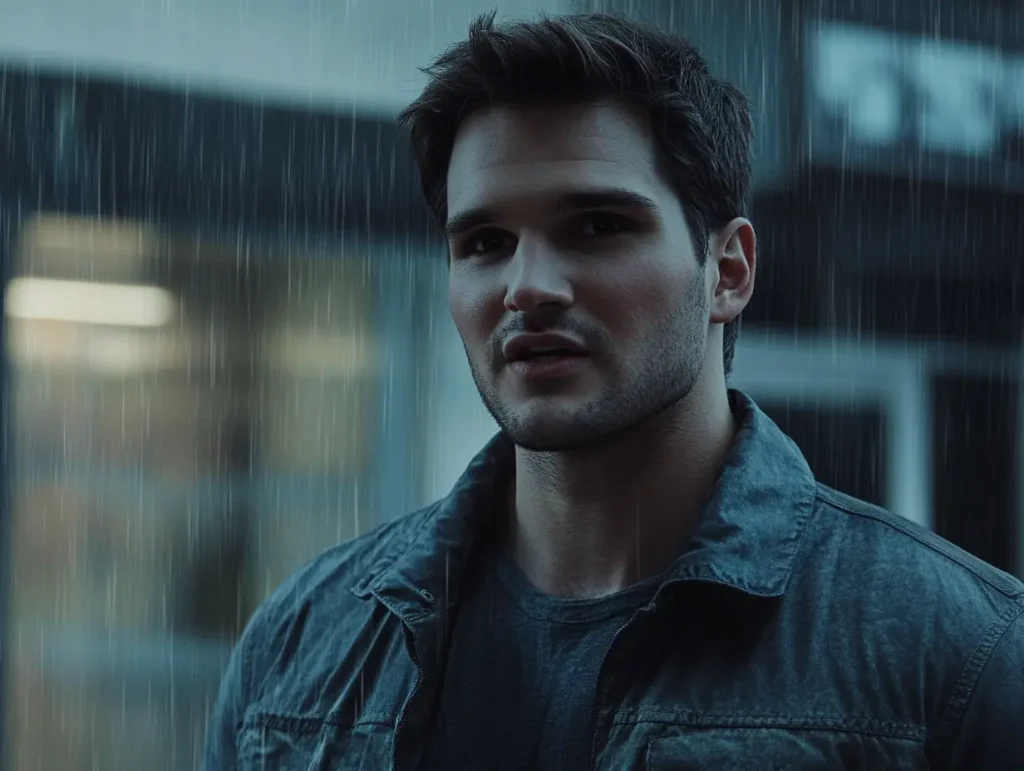
“You’ll get your truth soon enough,” she said. “I just hope it’s worth what it costs.” She turned and walked to her car. He didn’t follow. By the time she strapped the baby in and pulled out of the parking lot, she could see him in the rearview mirror, still standing there, motionless, waiting for the results that would decide the rest of their lives.
The next twenty-four hours passed like a fog she couldn’t escape. Emily went through the motions: feeding, changing, rocking the baby, but her thoughts never left that clinic parking lot. Every vibration of her phone made her heart lurch. Every silence made it worse. When the call finally came, it was early evening.

James had come home, unannounced, pale and drawn, his eyes sunken from sleeplessness. They sat at the kitchen table, the baby monitor humming softly between them. The phone rang, sharp and sudden. James answered. “Yes, this is James Parker.” He listened for several seconds, his face draining of color. Emily’s heart thudded. “What?” she whispered.
He turned toward her slowly. “They ran the test twice,” he said, his voice hollow. “I’m not the father.” Her stomach dropped. “That’s not possible.” He let out a bitter laugh. “You really are unbelievable.” Before he could say anything else, she snatched the phone from his hand. “This is Emily Parker,” she said, her voice shaking.
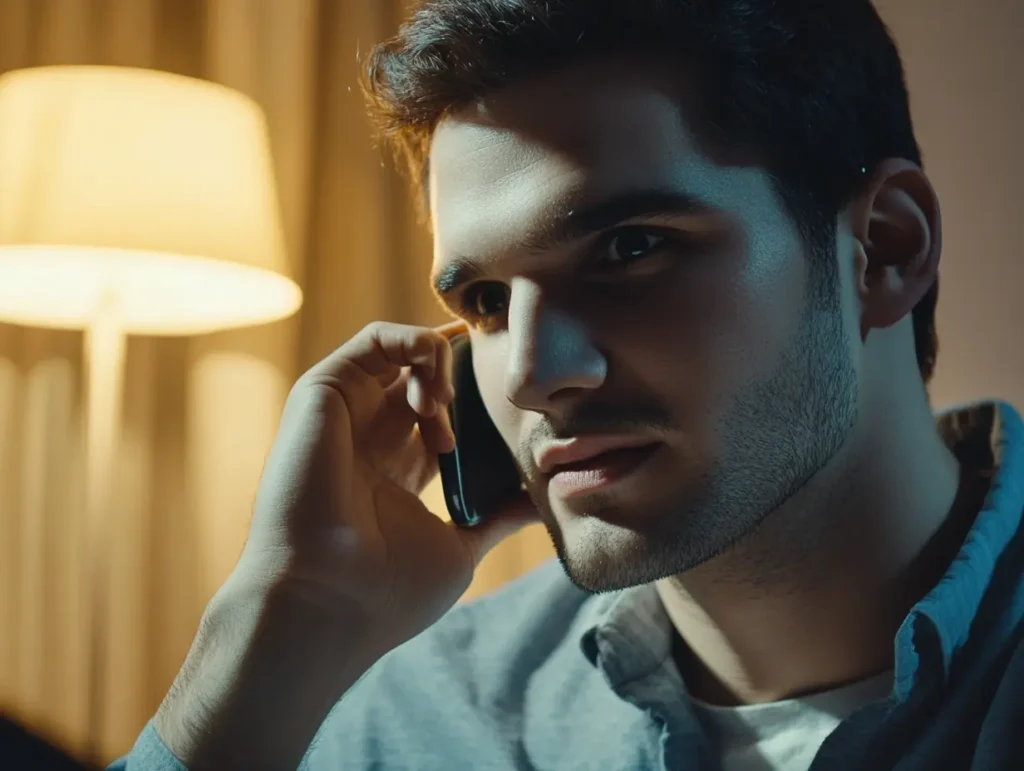
“There’s been a mistake. I need you to confirm what you just told my husband.” On the other end, a woman’s voice, rehearsed and professional. “I’m sorry, Mrs. Parker. We verified both samples. Your husband is not the biological father of the child.” Emily felt her pulse in her throat. “No,” she said.
“No, that can’t be right. There must’ve been a mix-up. I want to speak to Dr. Wilson — the doctor who delivered my baby.” “One moment, please.” As the line clicked, James’s voice tore through the kitchen. “A mix-up? That’s your story? God, Emily, just stop lying!” “I’m not lying!” she cried, pressing the phone tighter against her ear.

“Don’t you dare look me in the eye and tell me that child is mine!” he screamed. “I’m telling you the truth!” she screamed back. “Then explain this!” he shouted, slamming his fist against the counter. The baby woke with a scream. Emily turned away, voice trembling. “Dr. Wilson? Please. Tell me this can happen. That tests can be wrong.”
The doctor’s voice came through steady, careful. “Emily… I’m afraid it’s extremely rare for a test to be inaccurate, especially with repeat verification.” She felt her knees weaken. “You delivered her,” she whispered. “You saw us. You know…” her voice faltered. “I know how hard this must be,” Dr. Wilson said gently. “But mistakes in parentage testing are very uncommon.”

Behind her, James let out a short, broken laugh. “There it is. Straight from your friend at the hospital.” “James, please—” He stepped closer, his voice rising. “Please? You’ve been lying to me for months! You let me hold her like she was mine!” “She is yours!” “Don’t!” he roared. “Don’t say that again!” The baby’s cries filled the room, high and terrified.
Emily reached for her, tears blurring her vision. James backed toward the door, chest heaving. “I can’t do this,” he said. “I’m done. You hear me? I want a divorce. You and that child, whoever she is, you can have each other.” “James—” But he was already gone. The door slammed so hard the walls seemed to shake.

Emily stood frozen, the phone still pressed against her ear, the dial tone humming faintly. The baby wailed louder. She sank to the floor beside the crib, rocking back and forth, whispering to no one, “It’s wrong. It has to be wrong.” But deep down, she felt something crack, a line she couldn’t see, splitting through everything she thought was safe.
The house felt unrecognizable after he left. The silence wasn’t peaceful, it was suffocating. Every sound carried a weight: the creak of the floor, the faint ticking of the clock, the baby’s soft whimpering from her crib. Emily sat on the floor, knees drawn to her chest, the phone still on the table where she’d dropped it. Her eyes were swollen, her hands trembling.

She didn’t know how long she sat like that, only that the light through the curtains shifted from gold to gray before she moved again. The baby cried, a small sound at first, then louder. Emily wiped her face and went to her, scooping her up and holding her close. The warmth of that tiny body pressed against her chest was the only thing that kept her from unraveling completely.
“It’s okay,” she whispered, more to herself than to the baby. “We’re okay.” She had to believe it. Someone had to. When her daughter fell asleep again, Emily stood by the crib, watching the soft rise and fall of her chest. James was gone, maybe for good, but the baby wasn’t. And that meant she couldn’t fall apart. Not yet.

A few days later, she remembered the upcoming postnatal checkup circled faintly on the calendar. Routine visit, nothing serious. She almost considered canceling, but something about staying home felt worse. At least at the clinic, there would be answers, something normal to hold on to.
The nurse was cheerful, chatting as she drew a small vial of blood from the baby’s heel. “Just routine screening,” she explained. Emily nodded, forcing a smile. The doctor, Dr. Wilson, came in moments later, flipping through the file while gently examining the baby.

“Everything looks good so far,” she said, her tone light and confident. “Healthy weight, strong reflexes… you’re doing great, Mom.” Emily exhaled, tension melting a little. For the first time in days, she felt almost steady. But then the nurse returned with a small printout, handing it to the doctor. Dr. Wilson’s expression shifted, first puzzled, then tight.
Her eyes flicked from the page to the baby, then back again. Emily noticed immediately. “What is it?” she asked. The doctor didn’t answer right away. She blinked, as if startled by the question. “Huh? Oh. It’s nothing,” she said too quickly. “Just need to… check something.” And before Emily could ask again, she slipped out of the room.

Silence filled the space she left behind. Emily stared at the closed door, heart starting to race. The baby gurgled softly in her arms, unaware. The clock on the wall ticked loud enough to make her flinch. When Dr. Wilson finally returned, her face was composed, but her eyes gave her away. She sat down across from Emily, her tone cautious, almost apologetic.
“Emily,” she began slowly, “I need to double-check something in the hospital records. It seems there might have been… a mix-up.” Emily frowned, confused. “A mix-up?” The doctor hesitated. “Your baby’s postnatal results aren’t matching the file we have on record.” The words hung there, heavy and impossible. For a moment, Emily couldn’t breathe.

“What does that even mean?” Dr. Wilson hesitated, her hands clasped tightly in front of her. “It means… the records don’t align with your baby’s tests. The identification bands might have been switched after delivery.” Emily stared at her, not understanding. “Switched?” The doctor swallowed hard. “Emily… the baby you’ve been caring for isn’t biologically yours.”
Silence. “What?” The word barely left her lips. “I am so sorry,” Dr. Wilson said softly. “Your daughter was born the same night as another little girl, just a few minutes apart. You were in Room 204, and the other mother was next door in 203. Two deliveries happening almost at the same time, I was with you, and Dr. Patel was with her.”
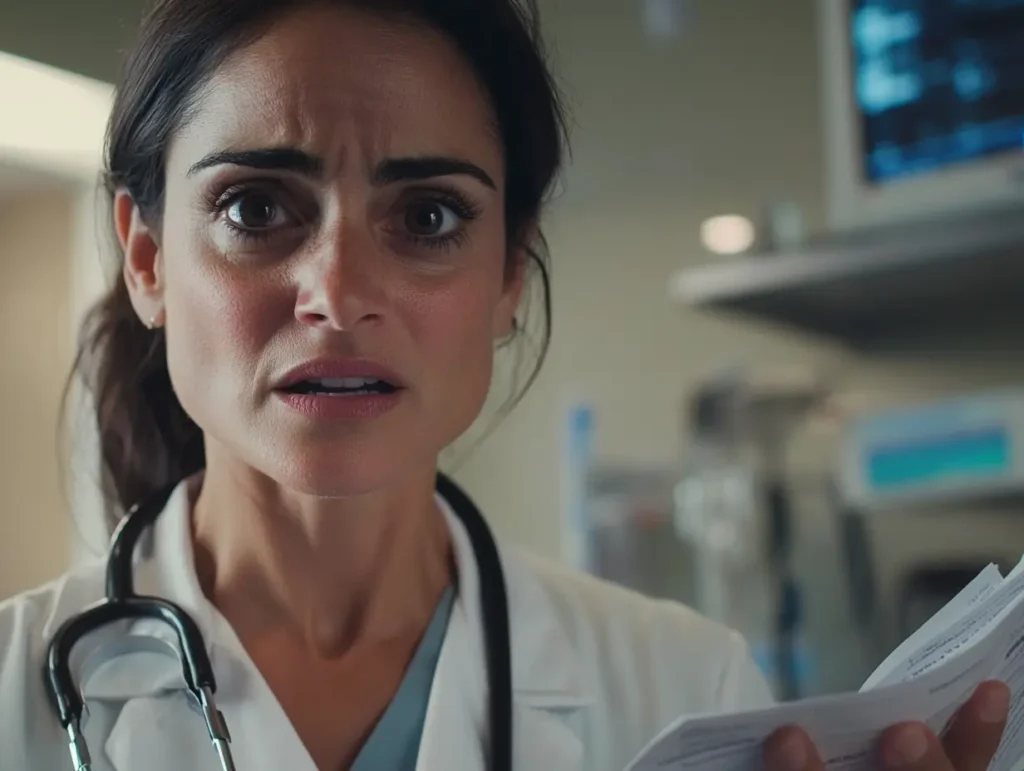
She hesitated. “It was a busy night. The nurses were moving quickly, transferring the babies to recovery while we finished the postnatal checks. Somewhere between weighing and tagging, the ID bands were placed incorrectly. And because each doctor assumed the other team had already verified the matches, no one noticed.”
Emily’s voice broke. “But you’re supposed to check those things. You said you did.” Dr. Wilson nodded, guilt heavy in her tone. “I did check the records, the files, everything looked consistent. The numbers aligned with what was logged by the nurses. It wasn’t until today that we realized the logs themselves were wrong.”

She drew a breath. “Both families asked about the babies’ pigmentation. We all said the same thing, that it was common for newborns to look darker or lighter right after birth and that it fades over time. At that point, there was no reason to question it.” Emily’s eyes filled. “You told me that. You told him that.”
Dr. Wilson lowered her gaze. “I know,” she said quietly. “And I was wrong.” Emily’s composure broke. “Wrong? My husband left me because of this. You told me not to worry, you looked right at me.” Dr. Wilson’s eyes glistened, but she didn’t look away. “The other family is here now. They need to know too.” A few moments later, the door opened.

A man and woman entered, pale, holding each other’s hands so tightly their knuckles were white. The woman’s gaze went instantly to the baby in Emily’s arms, and her face crumpled. “Mr. and Mrs. Graham,” Dr. Wilson said gently, “thank you for coming. I’ve spoken with Emily. It appears that during postnatal transfer, your baby and hers were mislabeled.”
The man blinked, disbelief turning to anger. “Mislabeled? What does that even mean?” Dr. Wilson drew a steady breath. “It means you both went home with each other’s daughters.’” Mrs. Graham covered her mouth with trembling fingers. “You’re telling me… my baby—” Dr. Wilson nodded. “We’ll begin immediate verification and reunite both families properly.”
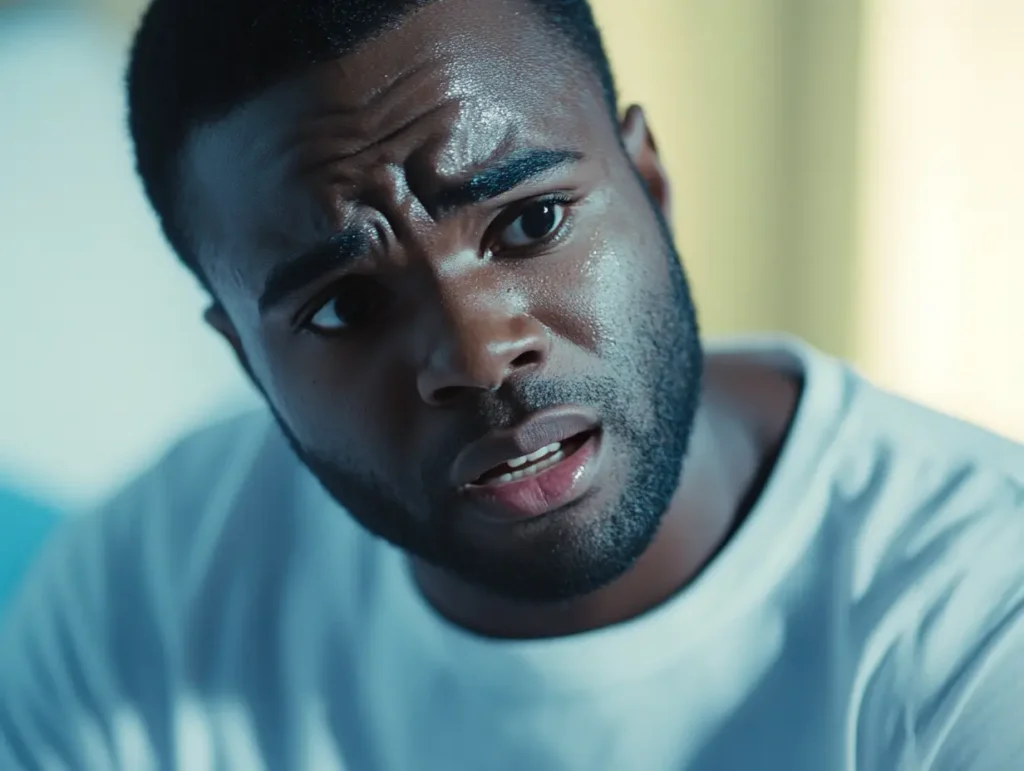
“But I have to be honest, this never should have happened.” she continued. Mrs. Graham’s voice cracked. “Never should have happened? You let me fall in love with someone else’s child!” Her husband stood, shaking. “We’re suing this hospital.” Dr. Wilson nodded faintly. “You have every right to.” Emily sat silent through it all, her body numb.
The shouting, the apologies, it all felt distant, muffled. Her mind drifted to the sound of James’s voice the day he left, to the doubt in his eyes that she’d mistaken for grief. When the noise died down, Mrs. Graham turned to her. “We’ll fight this,” she said firmly. “We’ll make sure they pay.” Emily nodded, her voice soft. “If you need a statement, I’ll give one.” Mrs. Graham blinked.

“You’re not angry?” Emily looked down at the sleeping baby in her arms. The child she’d held through every storm, loved through every accusation. “I don’t have any anger left,” she said quietly. “I just want to take her home.” Dr. Wilson opened her mouth, but Emily was already standing. “Please… just keep me updated.”
Outside, the air felt sharp and clean, like waking after a long illness. She strapped the baby into the car seat and sat behind the wheel, staring into the rearview mirror. Her reflection looked different, tired, yes, but steady. For the first time in weeks, she knew exactly what she had to do.

When she finally reached home, she laid her daughter gently in the crib and stood in the quiet for a long time. The house was still, almost peaceful. Then she picked up her phone. Her hands were trembling, but her voice was steady when he answered. “James,” she said. He hesitated. “Emily.” “They mixed up the babies,” she said. “The one we brought home wasn’t ours.”
There was silence. Then the faint sound of his breath catching. “What?” “Our daughter is safe,” she said softly. “The hospital called the other family. We’ve met. Everything’s been confirmed.” He didn’t speak right away. Then, in a low voice, “Can I come over?” She paused. “Do whatever you think is right.”

The knock came sooner than she expected, soft, hesitant, like he wasn’t sure he should be there. Emily stood in the hallway, her hands still damp from washing bottles. The knocking came again.
When she opened the door, James stood in the rain, hair plastered to his forehead, eyes swollen from crying or sleeplessness. “Emily,” he said quietly. She didn’t answer. “I didn’t know what to say,” he continued, voice trembling. Her expression stayed cold. “You always know what to say when you’re angry,” she replied. “But when you’re wrong, you go silent.”

He winced. “I deserve that.” “You deserve worse. You left me to defend myself for something I didn’t do.” she said flatly. “I thought—” he began, but she cut him off. “I know what you thought. You thought I cheated. And now you think showing up makes it right?” He shook his head quickly. “No. Nothing makes it right. I just needed to see you. To see her.”
“She’s asleep,” Emily scoffed. “You can see her in the morning,” she said sharply. “Please,” James whispered, desperation in his voice. “Just a minute.” Emily’s eyes softened, but only slightly. “You know what hurts most?” she asked quietly. “Not that you didn’t believe me, but that you wanted to believe the worst.”
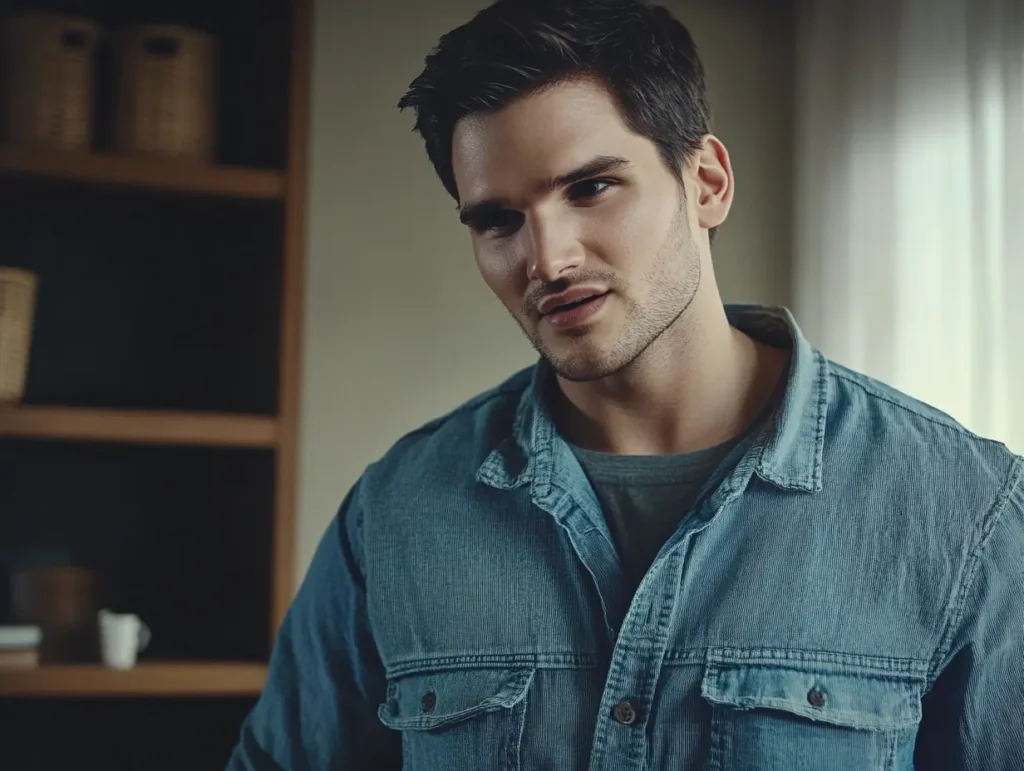
“I was angry,” James said, his voice breaking. “I was scared. I can’t take it back, but I can make it right.” “You can’t fix this with an apology,” she replied. “You asked for a divorce.” “I didn’t mean it.” “You said you couldn’t look at me.” “I can now,” he said softly. “You said you couldn’t look at her.” Tears spilled down his cheeks. “I was wrong.”
Rain filled the silence between them. “You broke us,” Emily whispered finally. “I know,” he said, trembling. “And if you never forgive me, I’ll still spend my life trying.” She sighed, voice low and tired. “You wanted a divorce, remember? Maybe I should give you what you asked for.” “Please don’t,” he pleaded. His voice cracked.

After a long moment, she said quietly, “Next time, James… believe me first.” When she stepped aside, he hesitated, just long enough to understand it wasn’t forgiveness, not yet. Only a chance. He followed her inside, rain dripping from his coat, the faint scent of baby powder lingering in the dimly lit house. “She’s upstairs,” Emily said softly. “Second door on the right.”
He nodded, voice barely a whisper. “Can I…?” She gave a small nod. “Don’t wake her.” He climbed the stairs slowly, each creak of the wood sounding louder than it should. When he reached the nursery, he paused at the threshold. The faint glow of the nightlight washed the room in a soft amber hue.

His daughter slept soundly in her crib, her tiny fists curled near her face. James stepped closer, his breath catching. For the first time, he saw her clearly, not as a question, not as proof or doubt, but as his child. He crouched down, his hands trembling as he rested one gently on the edge of the crib. “I’m so sorry,” he whispered. “For everything.”
She stirred slightly, letting out a small sigh before drifting deeper into sleep. James stood there for a long time, silent, tears slipping down his cheeks. When he turned, Emily was in the doorway, watching him. He met her gaze, eyes swollen and raw. “Thank you,” he murmured. “For what?” she asked quietly. “For letting me try again.”
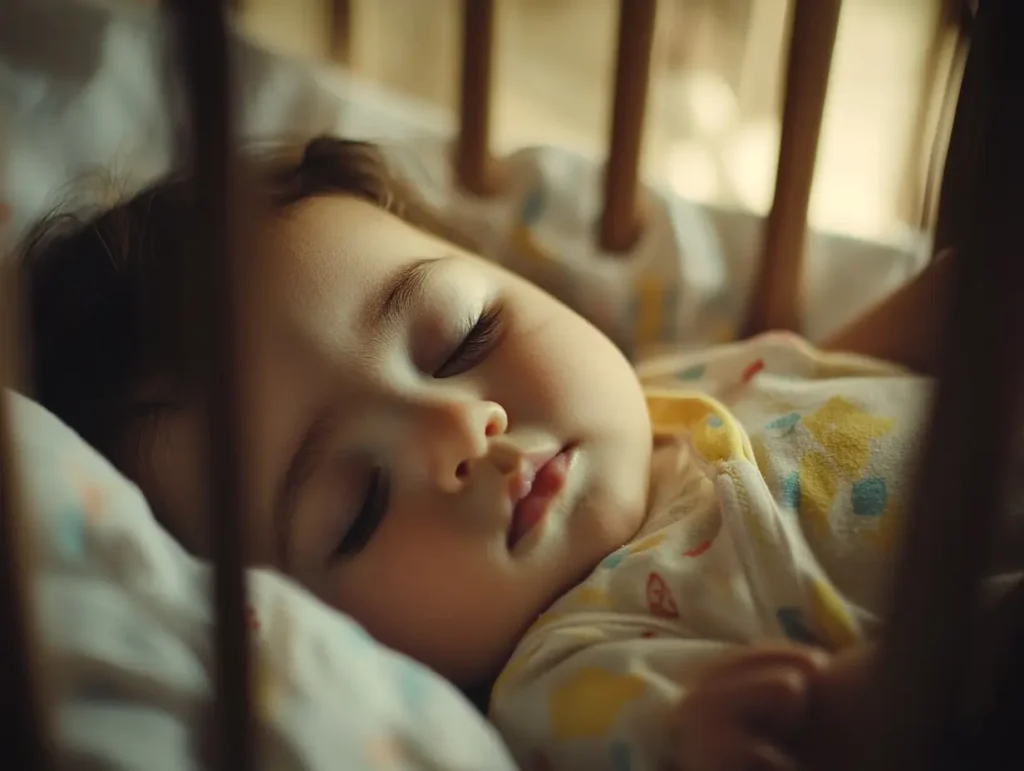
Emily’s expression softened just a little, not forgiveness yet, but something close enough to build on. Downstairs, the rain eased into a steady rhythm against the windows, the sound calm and rhythmic. For the first time in weeks, the house didn’t feel broken. It felt like a beginning.

